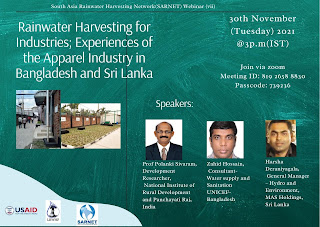Water Management experts from South Asia Region highlight the need for exploring alternative sources due to the increased demand for water with the Covid 19 pandemic

The 3 rd in the series the webinar organized by South Asia Rainwater Harvesting Network(SARNET) : “Covid 19, Rainwater Harvesting; Issues, challenges, and best practices” concluded on the 29 th of January 2021 with the active participation of 20 water management experts, activists and government representatives from South Asia. Rajindra Ariyabandu Chairman of the Lanka Rainwater Harvesting Forum opening the discussion highlighted the benefits of rainwater harvesting facility during the Covid-19 lockdown for communities in Sri Lanka. A Lanka Rainwater Harvesting Forum survey of rainwater harvesting households during the first wave of Covid 19 revealed that 92% of the households surveyed in 3 dry zone districts of Sri Lanka benefitted during the lockdown as they had adequate water at their home for drinking, hand washing, and cleaning purposes. The findings also revealed that 19% shared the water available in the rainwater harvesting tanks with others. Dhanushi Senanayake

